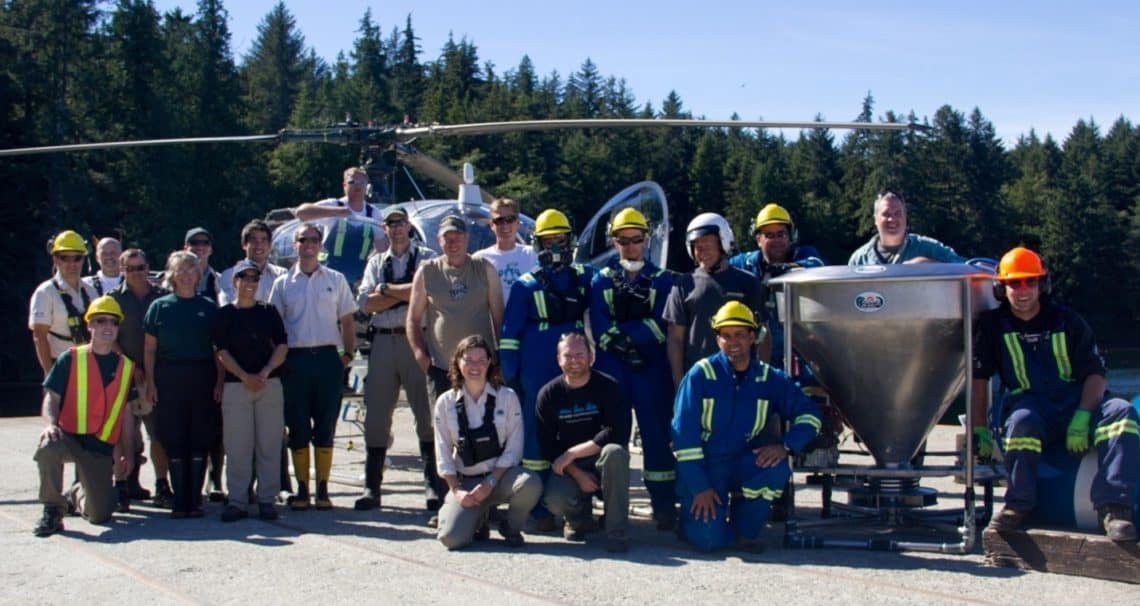By Annie Little, Wildlife Biologist, USFWS, Ventura, California
The countries of Canada, Mexico and the United States are inextricably linked through shared species, habitats, and ecosystems. The Trilateral Committee for Wildlife and Ecosystem Conservation and Management was established in 1995 to effectively address priorities of continental significance and enhance the conservation efforts of the North America bioregion. Created under the umbrella of the Trilateral Committee in 2014, the Trilateral Island Initiative promotes collaboration on the conservation and restoration of island ecosystems and their adjacent coastal and marine environments. This includes islands located in the Pacific, Atlantic, and Arctic Oceans, Gulf of California, Gulf of Mexico, and Caribbean Sea. The Trilateral Island Initiative provides a framework for Canada, Mexico, and the U.S. to work together towards the long-term conservation of islands across North America.

The Trilateral Island Initiative has the following goals: 1) strengthen on-the-ground conservation and restoration of islands and their surrounding marine waters, 2) improve coordination on natural resource issues of mutual interest, 3) strengthen institutional capacities, and 4) improve efficiencies and increase success of island-related conservation projects. The focus of collaborative efforts are on the following areas: invasive alien species, biosecurity, restoration, local communities, research and monitoring, and climate change. In order to enhance collaboration between the three countries, the initiative promotes activities such as joint conferences, workshops, trainings, exchanges, as well as sharing of expertise, technology, and resources.
The ocean waters surrounding North America contain rich and productive marine ecosystems that support more than 150 seabird species. According to the State of North America’s Birds 2016 Report, global seabird populations have declined nearly 70% since the 1950s. Due to their small and declining populations, limited ranges, and severe threats to their habitats, including invasive species, overfishing, bycatch, and climate change, Oceanic birds are identified by the report as the bird group of highest conservation concern in North America. Likewise, oceanic birds are a focal group for the Trilateral Island Initiative because their conservation requires protection at both their terrestrial breeding and roosting sites and marine foraging grounds, often in multiple countries.

One example of a successful binational collaboration in the SJV Region is a comprehensive seabird restoration project on seven islands on the Baja California Pacific Islands, Mexico. Partners include Grupo de Ecología y Conservación de Islas, Montrose Settlements and S.S. Jacob Luckenbach Trustee Councils, National Audubon Society, Cornell Lab of Ornithology, Friends of the Mexican Fund for the Conservation of Nature, National Fish and Wildlife Foundation, and Alianza WWF-Fundación Carlos Slim. During the 5-year project, seabird restoration activities included social attraction, monitoring, outreach, education and training, biosecurity, and disturbance reduction. Key outcomes to date include the recolonization of 21 extirpated colonies, establishment of 11 new breeding colonies, and an increase in reproductive success of target, shared seabird species such as the Ashy Storm-Petrel, Scripps’s Murrelet, and Cassin’s Auklet.
Partners, both public and private, are a key component of the Trilateral Island Initiative. Many successful island projects have been implemented by a blend of agency, academic, and non-government organization expertise and support. Collaborative partnerships have resulted in island conservation success stories across North America, including the eradication of invasive species in Canada, protection of rare species and ecosystems in the United States, and a systematic and comprehensive program to conserve and restore islands in Mexico. Please visit our website for more information on the Trilateral Island Initiative. If your organization is interested in joining the Initiative, please contact Annie Little.

